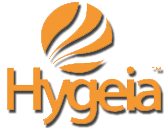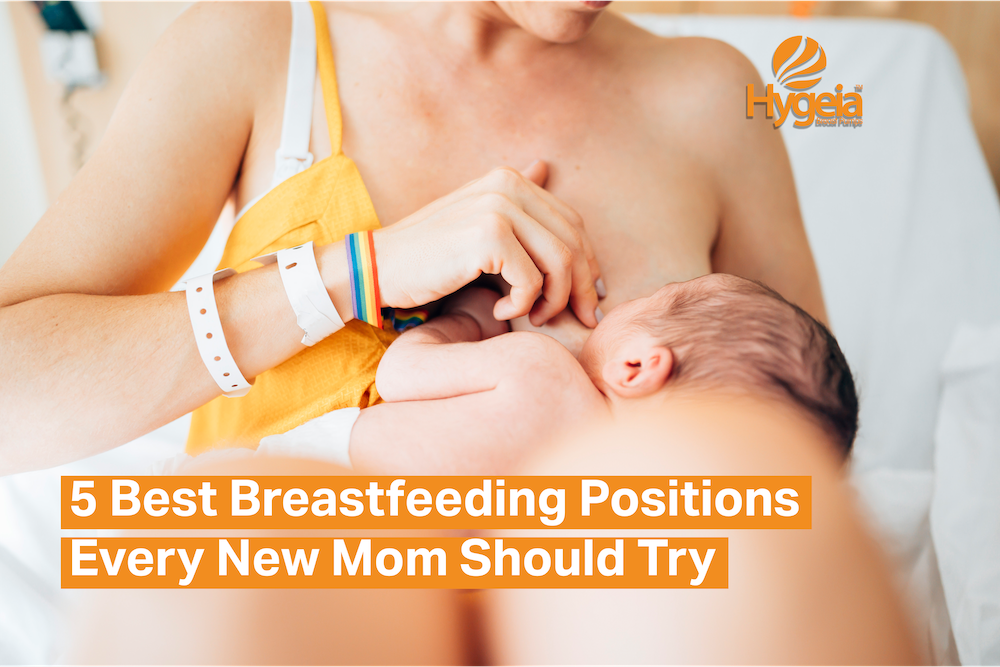
Finding the breastfeeding position can make all the difference in your comfort and your baby’s feeding success. Every mother and baby pair is unique, so what feels natural to one person might not work for another. The key is to experiment, stay relaxed, and choose positions that help your baby latch deeply while keeping you both comfortable.
Below are some of the best breastfeeding positions to try—each one with its own advantages depending on your body, your baby’s age, and your feeding goals. As you try different holds, it doesn’t hurt to ask for help from someone with experience to be sure you are getting them right. A nursing pillow can give you more freedom to get yourself and baby comfortable as these positions become more natural to you both.
1. The Cradle Hold
The cradle hold is one of the most classic breastfeeding positions and often the one new mothers try first.
How to do it:
- Sit upright in a comfortable chair or on a supportive bed.
- Hold your baby so their head rests in the bend of your arm, with their body turned toward you.
- Make sure your baby’s nose is level with your nipple and their head, neck, and body are aligned in a straight line.
Why it works: This position promotes closeness and eye contact. It’s ideal once your baby has developed a stronger neck and feeding rhythm. For newborns, it may take a little more coordination, so don’t be discouraged if it’s tricky at first.
Tip: Support your arm with a nursing pillow or rolled-up blanket to reduce shoulder and wrist strain.
2. The Cross-Cradle Hold
The cross-cradle hold is similar to the cradle hold but gives you more control over your baby’s head and latch—making it perfect for newborns or babies who need a little help getting a deep latch.
How to do it:
-
Sit upright and hold your baby across your body, tummy to tummy.
-
Support their neck and shoulders with the hand opposite to the breast you’re feeding from (for example, use your right hand for your baby’s head when nursing on the left breast).
-
Use your free hand to guide your breast and help your baby latch.
Why it works: This position lets you guide your baby’s mouth precisely to the nipple and adjust as needed for a better latch. It’s especially useful during the early weeks when you’re both still learning.
3. The Football Hold (Clutch Hold)
If you’ve had a cesarean birth or have larger breasts, this position can be a game-changer.
How to do it:
-
Tuck your baby under your arm like a football, with their legs pointing toward your back.
-
Support their head and shoulders with your hand and use a pillow under your arm for comfort.
-
Bring your baby’s mouth to your nipple, keeping their nose clear for easy breathing.
Why it works: It keeps pressure off your abdomen, supports smaller or premature babies, and helps you see your baby’s latch clearly. Many moms find it easier to maintain a deep latch in this position.
4. The Side-Lying Position
This one’s all about rest and relaxation—perfect for nighttime feedings or when you need to recover post-delivery.
How to do it:
-
Lie on your side with your baby facing you, tummy to tummy.
-
Support your head with a pillow and use another behind your baby’s back to keep them close.
-
Bring your baby’s nose to your nipple and allow them to latch naturally.
Why it works: You can rest your body while your baby feeds, and it’s gentle on your healing body after birth or a C-section.
5. The Laid-Back (Biological Nurturing) Position
This position takes advantage of gravity and your baby’s natural feeding instincts.
How to do it:
-
Recline comfortably on a couch or bed at about a 45-degree angle.
-
Place your baby tummy down on your chest, with their head near your breast.
-
Support your baby as they find the nipple and begin to nurse.
Why it works: This position encourages your baby to use their reflexes to find the breast and latch deeply. It also reduces nipple pain and helps milk flow naturally.
Comfort Tips for Every Position
No matter which position you choose, comfort for both you and your baby is essential. Here’s how to make feeding smoother:
-
Use pillows or cushions to support your arms, baby, and back.
-
Bring your baby to your breast, not your breast to your baby. Hunching forward can lead to back and neck pain.
-
Check for a good latch. Your baby’s mouth should cover most of the areola, not just the nipple.
-
Switch sides each feeding or halfway through to keep milk production balanced.
-
Stay hydrated and relaxed. Deep breathing before and during feeds can help your milk let down more easily.
- Ask for help. A lactation consultant can help you get comfortable or adjust your latch and hold appropriately, but even an experienced breastfeeding mom can be of great assistance.
Final Thoughts
Breastfeeding takes patience, practice, and a bit of trial and error. The “best” position is the one that feels right for both of you—one that supports your baby’s latch and your body’s comfort.
If you’re experiencing pain, soreness, or latch difficulties, don’t hesitate to reach out to a lactation consultant or your healthcare provider. Sometimes small adjustments make a big difference.
At Hygeia Health, we believe that comfortable, confident breastfeeding starts with the right support—both in guidance and in tools like our hospital-grade breast pumps. With knowledge, patience, and the right equipment, you can make breastfeeding a more enjoyable and successful experience for both you and your baby. Apply today to let Hygeia assist in getting your high quality breast pump covered 100% by your insurance.
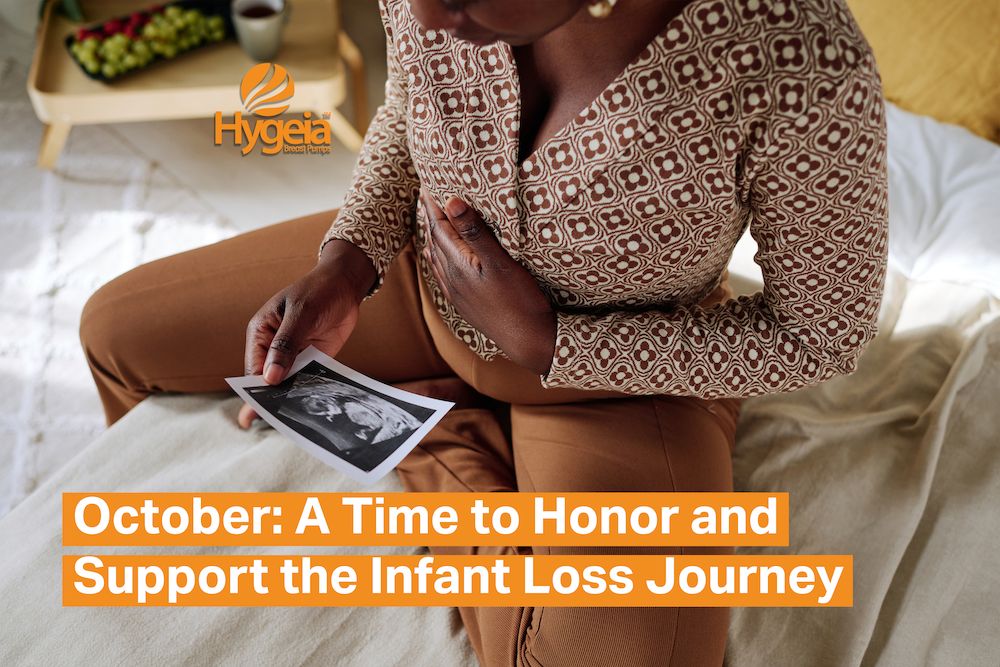
October marks Pregnancy, Infant, and Child Loss Awareness Month. This is an important time to make space for the profound grief carried by millions of families worldwide. For mothers, this is a time to honor the memory of a life gone too soon. It is a time to recognize that even a journey into motherhood complicated by loss is valid and deserving of support.
At Hygeia Health, we believe in supporting every aspect of the maternal journey, including the most difficult paths. Loss is deeply personal, but no mother should walk the healing road alone.
October 15: Pregnancy and Infant Loss Remembrance Day
In the United States, 1 out of every 4 pregnancies ends in miscarriage and 1 and every 160 pregnancies end in stillbirth. That makes for thousands of mothers and families affected by such tragedies every year. Those numbers don’t even include infant death from preterm labor, diagnosis of life-limiting conditions, or SIDS. It’s a heartbreaking reality but not one that should be looked past.
In 1988, President Ronald Reagan declared October to be Pregnancy and Infant Loss Awareness Month. Today October 15 is a special day of remembrance as well. Many will join across the globe for the what is known as the Wave of Light. Participants share stories and create this wave, lighting candles around the world, symbolizing that these losses are not endured alone. At 7 p.m. your local time, we encourage you to light a candle. Keep it lit for one hour, as the wave of light passes throughout the world.
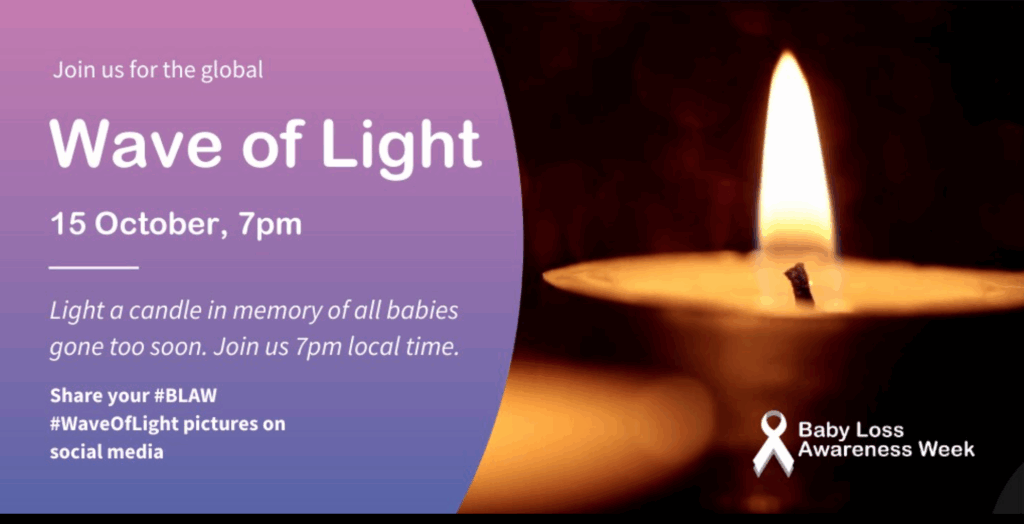
Ways to Participate and Support Mothers
These types of losses in motherhood impact everyone; even if you haven’t experienced the heartbreak firsthand, you know someone who has. Participating in the International Wave of Light is simply one way to support the awareness and give moms the confidence to know they do not suffer alone.
During October, moms are encouraged to share their baby’s story on social media using the #BecauseOfYouMyChild hashtag. Tag @pregnancyafterlosssupport on Instagram if you would like your story to potentially be shared to comfort other mothers.
The Pregnancy After Loss Support site also offers a #BecauseOfYouMyChild frame. This can be added to a favorite photo and posted to your social media feeds. Additionally, you can download PALS’ “footprints on my heart” graphics to share on social media, your blog, or website.
You can also make a donation to Pregnancy After Loss Support (PALS) in memory of a baby who has passed, and help keep PALS’ services and resources free for moms who are traveling the journey of pregnancy after loss.
The Physical Reality of Loss and Lactation
For mothers who continue their pumping journey, whether for current needs or in preparation for a subsequent pregnancy, we stand with you. We recognize that the anxiety and uncertainty of a pregnancy after loss can be immense. Focusing on preparation, like securing the best tools, offers a sense of control and hope during the healing journey.
Hygeia’s commitment goes beyond simply manufacturing equipment. It is rooted in recognizing the unique needs of every family. Part of effective loss support involves removing obstacles that add stress to the grieving process. High-quality lactation equipment should not be a financial burden. We aim to ensure that every mother who needs a breast pump—for any reason, at any stage of her journey—can access one easily.
If having a pump will relieve one aspect of the stress of your loss, we are here for you. Apply today to let Hygeia assist in getting your high quality breast pump covered 100% by your insurance.
This Pregnancy and Infant Loss Awareness Month, we honor the love that endures. We are dedicated to supporting your mental health and physical needs by providing the resources required for your unique journey. You are not alone.
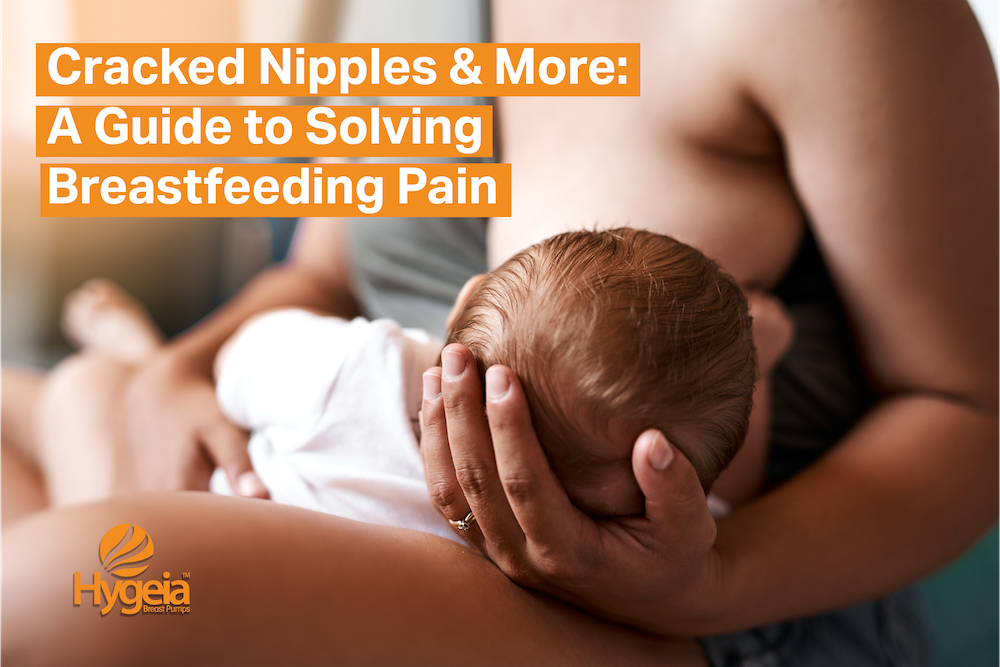
It’s time to bust the myth that has caused countless mothers unnecessary suffering. The idea that “painful breastfeeding is normal” is simply false.
“Suck it up.” “It’s a part of motherhood.” “Pain is normal.”
Sadly, these phrases are by many new mothers who are taking on breastfeeding. This misconception often leads mothers to give up or struggle in silence, believing that nothing can be done.
But the truth is, breastfeeding is not supposed to be excruciating. If it hurts, there’s a reason, and that reason can likely be solved. Breastfeeding is a natural and beautiful process but painful challenges arise for many new mothers. The good news is, most breastfeeding pain is preventable and treatable. Understanding the root causes is the first step to finding relief.
The Problem with a Poor Latch
One of the most frequent causes of breast pain is a poor latch. This is when a baby doesn’t take enough of the breast tissue into their mouth. Instead of latching onto the areola, they may only latch onto the nipple. This can lead to sore, cracked, or bleeding nipples.
The solution? Focus on a deep, wide-mouthed latch. Look for your baby’s mouth to be open wide like a yawn. Their chin should touch your breast first. See our full blog post on mastering the art of the latch here. A lactation consultant can be a lifesaver here, guiding you to achieve the correct positioning and a comfortable latch.
How to Manage Engorgement
Another common culprit is engorgement. This happens when your breasts become overly full of milk. Engorgement can make your breasts feel hard, tight, and painful. This can also make it difficult for your baby to latch. Gentle hand expression or pumping with a high-quality breast pump before a feed can help. It softens the areola, making it easier for your baby to latch. Cold compresses or chilled cabbage leaves can also provide temporary relief between feeds.
Clogged Ducts
Blocked milk ducts are another source of pain. This occurs when milk flow is obstructed. You may feel a small, tender lump in your breast. To clear a clogged duct, apply warm compresses to the area before feeding. Massaging the lump gently while your baby feeds can also help. Remember to breastfeed or pump frequently to keep the milk flowing. Skipping feeds can make the issue worse.
When to Seek Professional Help
Thrush is a yeast infection that can affect both the mother and baby. It causes a sharp, burning pain in the nipples. You might also notice a white coating in your baby’s mouth. This requires medical attention for both of you. A doctor or lactation consultant can provide the correct diagnosis and a treatment plan to get you back on track.
Sometimes, a baby’s anatomy can contribute to pain. Conditions like a tongue tie or lip tie can make it hard for a baby to get a good latch. This can lead to inefficient milk transfer and pain for the mother. A professional diagnosis and treatment from a healthcare provider can fix this issue and make breastfeeding more comfortable for everyone.
Finding Your Solution
Breastfeeding should be a positive experience. If you are experiencing pain, know that you are not alone, and there are solutions available. From adjusting your latch to using the right tools, relief is within reach. A quality breast pump can be an essential tool in your kit, helping with engorgement and milk supply.
At Hygeia Health, we believe every mother deserves a comfortable breastfeeding journey. Our breast pumps are designed for maximum comfort and efficiency, helping you maintain a healthy milk supply and manage common issues like engorgement.
Take the first step toward a more comfortable breastfeeding experience. Apply today to let Hygeia assist in getting your breast pump covered 100% by your insurance. You deserve the best tools to support your health journey.
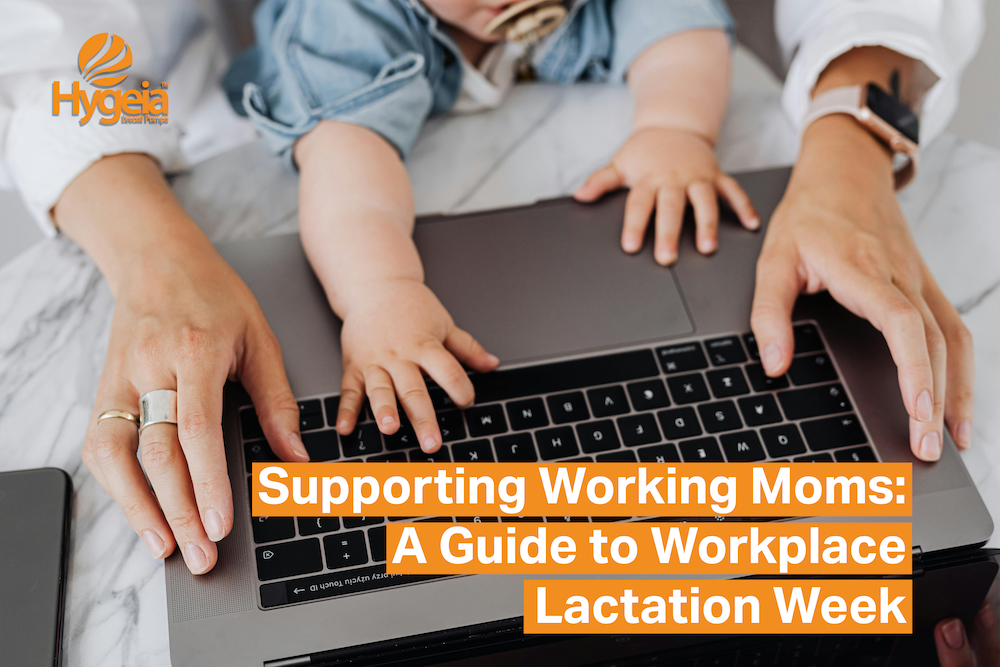
While August and National Breastfeeding Month have come to a close, the first week of September marks Workplace Lactation Week. It is a vital time to recognize the importance of supporting breastfeeding employees around the globe. For many mothers, returning to work can be a challenging time. The breastfeeding journey should not have to end when a mother’s maternity leave does and this week we spotlight the why and how of it.
A World of Support: Creating Breastfeeding-Friendly Workplaces Everywhere
With the theme “A World of Support: Creating Breastfeeding-Friendly Workplaces Everywhere”, this is the third annual celebration of Workplace Lactation Week. It is celebrated September 1-7 to coincide with Labor Day each year. The week is aimed to to be a resource for leaders, parents, and businesses, providing essential information, resources, and best practices to promote a truly supportive and lactation-friendly work environment for everyone.
The idea of coinciding with Labor Day is to highlight the vital role that working and pumping parents play in the workforce. It’s a time to recognize and support the efforts of working parents who balance the responsibilities of their careers and caring for their children. Whether you’re a mom who works in an office, a factory, remotely, or you are traveling, this week is meant to support moms in all work spaces.
Why Workplace Lactation Week Matters
For many years, the challenges of pumping at work were a private struggle. Mothers often had to find makeshift spaces to express milk. They did this while juggling the demands of their jobs. Workplace Lactation Week was created to bring this issue into the light. It promotes policies that protect and support lactating employees.
This week is a win for everyone. It matters on multiple levels and they highlight just a few of these reasons on their site:
- Employee Retention and Satisfaction: Providing lactation support demonstrates care and commitment to employees, leading to higher job satisfaction and improved retention rates.
- Increased Productivity: When nursing mothers and parents have access to comfortable and designated lactation spaces, they can express human milk efficiently and return to work with increased focus and productivity.
- Legal Compliance: Complying with lactation support laws not only avoids penalties but also reinforces a company’s commitment to ethical practices and family-friendly policies.
- Health and Well-being: Chest/breastfeeding offers unparalleled health benefits for babies, enhancing their immunity and overall development. For mothers, lactating reduces the risk of various health conditions such as ovarian, breast, and thyroid cancers, and promotes postpartum recovery.
For employees, workplace lactation support means they can continue to provide their babies with breast milk. This maintains the health benefits for both mother and child. It reduces stress and increases job satisfaction. For employers, it’s a smart business decision. Companies that offer strong lactation policies see higher employee morale and productivity. They also have lower rates of employee turnover. Investing in a breastfeeding-friendly workplace shows a clear commitment to an inclusive and supportive company culture.
Your Rights and Resources
Federal law provides important protections for employees who need to express milk at work. These laws require employers to provide reasonable break time and a private space, other than a bathroom, for breastfeeding. Understanding your breastfeeding rights is a crucial first step.
In the U.S., federal, state, and local lactation laws exists to guide organizations and support new parents. Pivotal laws include are the federal PUMP (Providing Urgent Maternal Protections) Act and the Pregnant Workers Fairness Act (PWFA), both aimed at enhancing support and ensuring that working and pumping parents have the necessary protections and accommodations to thrive.
The next step is getting the right tools. A high-quality breast pump is essential for any mother who is pumping at work. It must be efficient, comfortable, and reliable. At Hygeia Health, we design our breast pumps with these needs in mind.
We know that navigating insurance can be difficult. Our goal is to make the process simple. We work directly with insurance providers. We ensure that mothers can get a free breast pump through their plan. This removes a significant financial barrier. It allows a mother to focus on her baby and her work. We are also committed to removing financial barriers for mothers. You can find out if you qualify to receive a Hygeia pump 100% covered by your insurance plan. Find out if you qualify here.
Taking Action
Workplace Lactation Week is a time to celebrate progress. It is also a call to action. We encourage all companies to review their policies. We urge mothers to learn their rights and use the resources available. At Hygeia Health, our mission is to empower you. We want to support your health and career goals. We are here to help you get the tools you need. Apply now to see if you qualify for a free breast pump through your insurance. Let us help you continue your breastfeeding journey with confidence.
Hygeia Health is a proud partner in this mission. We provide the tools and resources for mothers to succeed in both their professional and personal lives. Follow the movement on Instagram and Facebook.
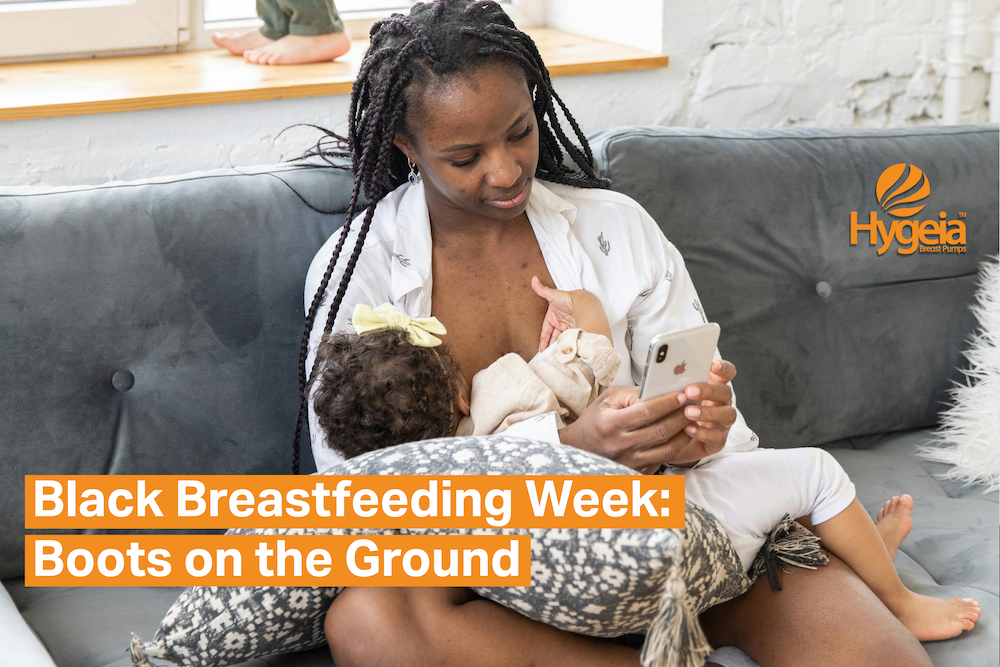
August is National Breastfeeding Month, and this final week, August 25-31, is dedicated to Black Breastfeeding Week (BBW). This week is a crucial part of the national observance. It highlights the unique challenges and triumphs of black mothers on their breastfeeding journeys. This blog post will explore why this week is so important and how you can get involved. The 2025 theme for BBW is Boots on the Ground: Rooted in Breastfeeding Success, Grounded in Community Support.
Why Black Breastfeeding Week Exists
Black Breastfeeding Week began in 2013. It was created to address the significant racial disparities in breastfeeding rates. For decades, Black women have had the lowest breastfeeding rates in the U.S. This is not due to a lack of desire to breastfeed. It is a result of historical and systemic barriers. These barriers include a lack of targeted community support, racial bias in healthcare, and the historical trauma of slavery, which severed cultural connections to breastfeeding.
This week exists to bring awareness to these issues. It celebrates the strength and resilience of the Black community. It provides a platform for education and advocacy. The goal is to build a supportive network that addresses systemic inequalities and promotes health equity for Black families.
What to Expect During Black Breastfeeding Week
Black Breastfeeding Week is a vibrant time of celebration and education. The week is filled with events both online and in local communities. While specific events vary each year, you can typically expect a mix of the following:
Virtual Events: Many organizations host webinars and online conferences. These sessions focus on topics like historical context, finding community support, and overcoming common breastfeeding challenges. Be sure to check out the Virtual Open Mic Night on Saturday, August 30 at 4 p.m. EST.
Community Gatherings: Local organizations often host meet-ups, workshops, and latch-on events. These gatherings provide a safe and encouraging space for new mothers to connect. For those in the Oakland, CA or New York City area, can check out the Oakland or Harlem Open Mic Nights on Aug. 25 and Aug. 28. Search online for events are happenings in your area.
Social Media Campaigns: The Black Breastfeeding effort is strong on social media and you can help spread awareness from wherever you are and whatever you are doing simply by sharing posts and engaging with them. Expect to see powerful stories, art, and information shared widely online. They can be found on Facebook, Twitter and Instagram. Following the official hashtags is another great way to show your support and learn more throughout the campaign. Check out: #BBW25 #BootsOnTheGround #blackbreastfeedingweek
Expert Q&As: Lactation consultants and healthcare professionals often offer live Q&A sessions. These provide valuable, accessible information for mothers. At Hygeia Health we partner with Nest Collaborative to provide virtual breastfeeding consults accessible anytime, anywhere, covered by most insurance plans at no cost to you.
To find a full list of official events, visit the Black Breastfeeding Week website.
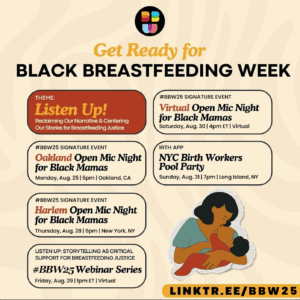
Supporting All Moms During National Breastfeeding Month
At Hygeia, we believe every mother deserves full support on her feeding journey. We understand that a high-quality breast pump is a tool that can make a big difference. Our breast pumps are designed for both comfort and efficiency. We are also committed to removing financial barriers for mothers. You can find out if you qualify to receive a Hygeia pump 100% covered by your insurance plan. Find out if you qualify here.
Black Breastfeeding Week reminds us that true support must be inclusive and culturally sensitive. It is an opportunity for all of us to listen, learn, and act. By championing equity in lactation care, we help build a healthier future for all children. Join us in celebrating this important week and supporting every mother’s choice.

